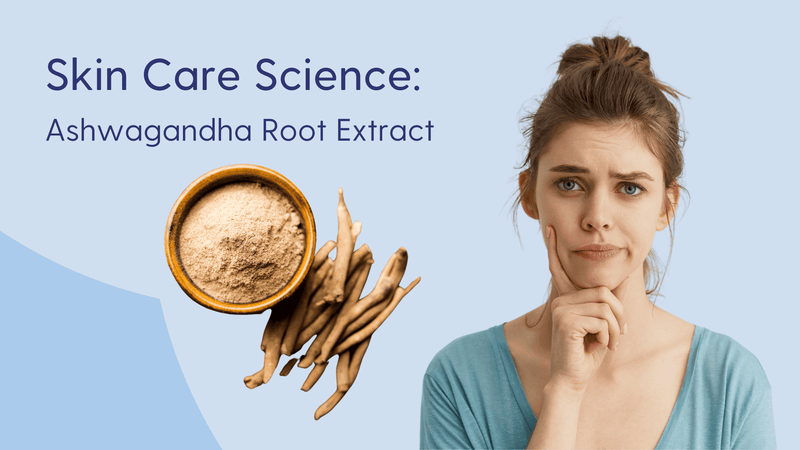
The Science of Ashwagandha Root Extract in Skin Care
|
|
Time to read 6 min
|
|
Time to read 6 min
Ashwagandha root, also known as Indian Ginseng, is starting to gain popularity in the skin care world for its versatile interactions with the skin. In this blog, we break down the benefits, risks, and chemical make up of this ingredient so you can understand how it is used in skin care. Additionally, we will recommend a few of our favorite products with ashwagandha root.
As a Thank you for reading our educational content, please accept 20% Off your next order when you use the code STSBlog20 at checkout!
[[ctaquiz]]
Ashwagandha root extract has strong anti-inflammatory, antioxidant, and anti-aging benefits.
It is generally well-tolerated by most skin types.
It is found in skin care products like Alastin Skincare’s Aluminate Brightening Serum.
Withania somnifera, commonly known as ashwagandha, is a plant native to India and North Africa. It has been a staple in Ayurvedic medicine for centuries, used to combat stress, enhance energy levels, and improve overall health. Ashwagandha root extract contains a variety of bioactive compounds, including withanolides, which are believed to contribute to its therapeutic effects. In skincare, Ashwagandha root extract is used for its antioxidant, anti-inflammatory, and anti-aging properties.
Ashwagandha root extract is becoming a popular ingredient in various skincare products, from serums to creams. One notable product is Alastin Skincare’s Aluminate Brightening Serum, which incorporates Withania somnifera (ashwagandha) root extract for its anti-aging benefits. This ingredient is included to help brighten the complexion, reduce inflammation, and protect the skin from environmental stressors.
Ashwagandha root (aka Indian ginseng) is made up of various plant compounds with studied effects in skin care products. Here are some of the most notable compounds and their basic functions:
These various compounds and their benefits are very much in tandem with the benefits typically associated with ashwagandha root.
Ashwagandha root extract offers several key benefits in skin care, including:
Antioxidant protection. Ashwagandha is rich in antioxidants, which help to neutralize free radicals and protect the skin from oxidative stress. This can help to prevent premature aging and reduce the appearance of fine lines and wrinkles.
Anti-inflammatory properties. The anti-inflammatory properties of Ashwagandha root extract can help soothe irritated skin, making it beneficial for conditions such as acne, rosacea, and eczema.
Anti-aging properties. In addition to its antioxidant properties, ashwagandha root extract can help to reduce signs of aging by stimulating the production of natural oils, which can keep the skin hydrated and plump. This can reduce the appearance of fine lines and promote a youthful complexion.
Skin-brightening properties. Ashwagandha can help to even out skin tone and reduce hyperpigmentation, giving the skin a brighter, more radiant appearance.
Stress reduction. As an adaptogen, ashwagandha helps the body cope with stress. When applied topically, it can help reduce the impact of stress on the skin, such as redness and sensitivity.
While ashwagandha root extract is generally well-tolerated, some people may experience some mild side effects, including:
Allergic reactions. Some people may develop signs of allergic reactions, such as redness, itching, or swelling.
Skin irritation. In rare cases, ashwagandha can cause skin irritation, particularly in those with sensitive skin.
Photosensitivity. Ashwagandha root extract may cause an increased sensitivity to sunlight, so it’s important to use sunscreen when incorporating this ingredient into your skincare routine.
Topical application of ashwagandha root extract is considered safe for most people . However, it is always a good idea to do a patch test before trying a new product. Additionally, while topical use is generally safe, oral consumption of ashwagandha is not recommended during pregnancy. If you are pregnant or breastfeeding, consult your doctor before using products containing ashwagandha, and limit application to small areas of your face.
Ashwagandha root extract is a versatile ingredient in skincare, offering a range of benefits from anti-aging to anti-inflammatory effects. While generally safe for topical use, it’s important to be aware of potential side effects and consult with a healthcare provider if you have any concerns. By incorporating products like Alastin Aluminate into your routine, you can reap the anti-inflammatory and antioxidant benefits of ashwagandha to achieve healthier, more radiant skin.
[[ctaquiz]]
Oral consumption of Ashwagandha can benefit the skin indirectly by reducing stress and promoting overall health. Lower stress levels can lead to improved skin appearance and reduced inflammation. However, always consult with a healthcare provider before taking ashwagandha supplements, especially if you are pregnant or breastfeeding.
Ashwagandha root extract is non-comedogenic, meaning it does not clog pores. Instead, its anti-inflammatory properties can help to reduce acne and prevent breakouts, making it a suitable ingredient for those with acne-prone skin.
Ashwagandha does not make the skin oily. In fact, it helps to balance the skin’s natural oil production, potentially reducing excess oiliness. Its adaptogenic properties help the skin adapt to stress, maintaining a healthy balance and preventing overproduction of sebum.
Ashwagandha root extract is generally suitable for all skin types, including sensitive and acne-prone skin. Its anti-inflammatory and non-comedogenic properties make it a versatile ingredient that can help soothe irritation, reduce inflammation, and balance oil production. However, it is important to gradually introduce new products and ingredients to your skin and understand which of the 16 skin types you are before adding new products to your regimen.



